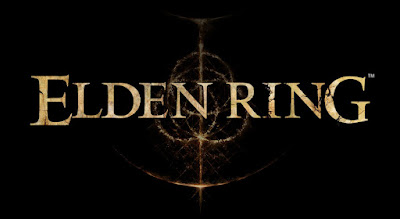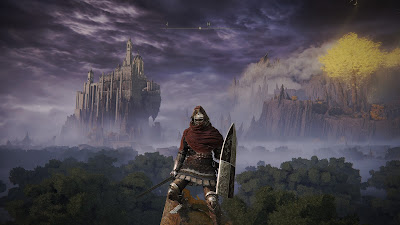[contains minor spoilers—mostly names of stuff]
On one hand, open world Dark Souls sounds like a terrible idea. The genre is at its best when you're crawling through tightly designed, mischievous levels like Shulva, Lothric, Irithyll, Oolacile Township, and the downright devilish Sen's Fortress. Meanwhile, the wider, more open areas tend to be categorized by their sloppy enemy placement and mandatory sprints: Darkroot Basin, Ash Lake, Belfry Sol, Road of Sacrifices, Mibu Village, Demon Ruins, and Lost Izalith. That's not to say that these zones are categorically terrible—I quite like Ash Lake, Mibu Village, and yes, even Lost Izalith—but if someone told you "imagine the Royal Wood, but 100x bigger!", no one would fault you for rolling your eyes. An open world Dark Souls is a disaster waiting to happen, one that could've only been greenlit by a brainless executive in pursuit of a trend a decade old by now. It's a crass and careless fantasy better left in the margins of a middle schooler's notebook.
On one hand.
On the other hand is Elden Ring, a game so utterly majestic that the first hand deserves to be severed for daring to doubt it.
So, first things first: Elden Ring is Dark Souls 4 in all but name. Expect most of the series' staples to return, albeit under a new pseudonym: Estus Flasks are now Crimson Flasks, Weapon Arts are Ashes of War, rings are talismans, soapstones are fingers, embers are rune arcs, ashes are bell bearings, so on and so forth. Most of the habits you pick up from the Souls series can also serve you well: expect monsters around corners, roll for bosses you can't block, leveling weapons trumps leveling stats, don't give up skeleton!, and heed the cryptic advice you'll receive from NPCs. Sometimes I knock other games for borrowing a bit too much from Dark Souls (Mortal Shell, Salt and Sanctuary) but it's kind of hilarious how naked Elden Ring's roots are. Hell, the premise of the game is to play as some Joe Schmoe seeking to succeed the ruler of a broken kingdom, embarking on a vague quest to claim their age-defining MacGuffin—if that doesn't reek of Dark Souls, what does?
If you can make it over that meagre hurdle, Elden Ring will bloom like an other-worldly flower. It takes Dark Souls 3's gameplay and expands on it in all directions: you can now customize your armament's Weapon Art Ashes of War, you can call upon (and upgrade!) ghostly allies in solo, and there's a massive crafting system that lets you to generate items on the spot. On top of all that, there's ~100 named bosses, ~150 spells & incantations, and ~200 weapons that span a gamut of playstyles, all flung across Elden Ring's beautiful, staggering world. And that's no exaggeration; Elden Ring's Lands Between is a gargantuan continent hosting a variety of vividly colored biomes, castles, and vile dungeons to delve into. I beat the game around the 130 hour mark and continued to discover new things for 30 hours past that—all on a single character/build.
A jaded player will be quick to question these PR-like boasts: "This sounds like it has the Dark Souls 2 problem of quantity over quality." And to that I'd hesitantly reply "... eh kinda." Make no mistake—Elden Ring is not only more substantial than the bloated cousin, but also smarter with its space, feeling less like a patchwork of disparate ideas and more like a melting pot of cool concepts. There's no windmill that suddenly transports you to the heart of a volcano, or dull boss encounter on the main path designed to waste your time like the Ancient Dragon, Twin Dragonriders, and Prowling Magus. Each of the game's major locations are visible from afar, and the duels awaiting you inside of these elaborate (and non-linear!) fortresses are among From Software's best.
Unfortunately, Elden Ring succumbs to a major foible, one that's apparently baked into the open world genre's foundation: repetition.
Now "repetitive" is not the first word I'd use to describe Elden Ring—evidently it's "majestic"—but the adjective does apply to a lot of the game's content. Catacombs, caves, villages, and wooden shacks are cobbled together from pre-fabricated building blocks, meaning you'll see over and over again with very few alterations added (or in the case of the merchant shacks—none.) Likewise, enemies in the latter half of the game will be familiar foes with mostly minor changes, dulling the allure of a new zone as you realize you'll be fighting "that damn thing!" yet again. Not even bosses are immune to repetition, spanning from story bosses with inexcusable clones (how are there multiple Astels, Mohgs, and peg-legged Commanders?) to minor bosses that are recycled so frequently they become tiring (Watchdogs, Avatars, and Tree Spirits.) This problem is less egregious if you beeline your way through the main story, but for anyone looking to 100% the game, it'll feel as though you've literally played through the entire thing twice—and then some.
Like Breath of the Wild, Elden Ring is at its strongest at the start of the game where every interaction with the world is fresh, exciting, and tinged with suspense. Yet unlike Breath of the Wild, Elden Ring maintains its charm throughout the entire journey... even if it is most of the charm is front-loaded. Despite the rampant reuse of architecture, enemies, and bosses, From Software sprinkles in some magic every now and then to keep the thrill of adventure alive. Sometimes it's an old foe busting out a new attack, or an alternate method of reaching a towering mausoleum, or an inconspicuous wall that when struck, reveals an entirely new location or boss fight. There's plenty of really cool, rarely-used events that'll surprise you just as you start growing complacent—and if friends or family members are also playing the game, expect to uncover even more wild secrets ("wait, how did you get into Volcano Manor?!")
Another reason Elden Ring's world never loses its luster is because it hides a treasure trove of unique items. No matter which direction you start exploring in, you're bound to find some new armor, ashes, spells, or weapons—none of which are procedurally generated. There's nothing quite like beating a difficult boss or surviving a poisonous grotto to then encounter a shiny new reward that synergizes perfectly with your current build. Of course, expect to venture through plenty of dungeons and groan at the outcome (especially if you don't dabble intelligence or faith), but it's a small price to pay for having a world that lets you go anywhere and fight anything. For me, I had plenty of fun collecting exotic weapons and scrolls inlaid with the bizarre magics; if you're a fan of theorycrafting builds, Elden Ring only gets better and better the deeper you dive into it.
It's not just the player's arsenal that's received a huge upgrade however—expect enemies to be harder, trickier, and far more ruthless than in the past four Souls titles. While you can easily offset the challenge by summoning allies or looking up overpowered builds, pure solo/melee folks are going to have their work cut out for them. In fact, the first story boss you're likely to run into—Margit—is worthy of being a final boss in plenty of other games, including Demon's Souls itself. And a dark pallor will befall your face upon realizing he's just the appetizer! Elden Ring furthers the frantic, hard-won battles of Sekiro and Bloodborne, handing complicated combos, animation cancelling, and magical artillery to dozens of bosses—and even some regular enemies!
While it can be overwhelming to tussle with so many foes that know no chill, I found the higher intensity of combat kept the experience tense and organic. Whenever I struggled too long with a fierce enemy, I was prompted to reassess my armor and talismans, trying to figure out how to best alter my approach. Should I be two-handing my weapon? Relying on my shield more? Or do I have some physick ingredients that can shift the tide of battle in my favor? If all else failed and I grew weary of having to fight tooth and nail against yet another hyper-aggressive boss, there were a myriad of dungeons left to explore in the distant hills, offering a chance at restoring my lost confidence. Plus, the complicated move sets given to your enemies help to ameliorate their frequent reuse, promising an edge-of-your-seat battle even when you're up against your fifth Crucible Knight (best enemy in the game!)
What really solidified Elden Ring as a phenomenal game for me wasn't any single one moment (though discovering that Leyndell was built into the very Erdtree itself came close) insofar as noticing the rate at which I was gobbling the game down. Over the course of a month I was routinely dumping my free time into it, at an upwards of eight hours a day on the weekends. Elden Ring had morphed into a full time job that kept me joyously restless and constantly curious as to what dangers lurk inside the new dungeon I'd discovered, or if I could find a weapon to replace my ever-reliable longsword (I found two! The Golden Epitaph and the Godslayer, among many other candidates.) It was an experience that didn't let up until the credits rolled—and even afterwards I was hungry for more, scribbling my summon sign down in front of boss doors to relive the best battles in the game. Elden Ring left me bewildered, not only by how much content From Software managed to stuff into this mountain of a game, but also because somehow, even after I'd explored every inch of the Lands Between, I was left hungry for more.
What I wrote in the introduction wasn't meant as a joke—there were a lot of things that could've gone wrong with Elden Ring. And given how many times the game was delayed, how infrequently it was being shown to the press, and the way the first trailer visually paled compared to the Demon's Souls remake, fans were right to be nervous and a little doubtful. But time and time again, From Software expertly delivers some of the most hair-raising, intense, and genuinely surprising moments you can only find within a video game. Even if Elden Ring feels like a Souls game at heart, it has transcended to a new plane, bestowing upon the player a vibrant variation of playstyles, exploration, and customization. Its world is gorgeous, its fights brutal, and the wealth of content is as plentiful as it is phenomenal. Elden Ring is perhaps From Software's best game yet; finally, we have Dark Souls II done right.





No comments:
Post a Comment